12 Juneteenth Celebration Ideas: Embracing Freedom and Inclusion at Work
Juneteenth is an annual celebration that acknowledges and honors the history and experiences of enslaved African Americans. It encourages discussions about intersectionality and the continued challenges they face.
Celebrating Juneteenth in the workplace is a meaningful way to demonstrate your commitment to nurturing a culture of diversity, equity, and inclusion (DEI). Many Americans are eager for advancement in DEI, particularly regarding pay and opportunity equity and reducing workplace discrimination.
With Juneteenth celebrations at work, you can help foster an understanding of the historical roots of African American culture from the point of view of these issues and the examples that still exist today.
Here are some Juneteenth celebration ideas that could play a key role in your organization's diversity, equity, and inclusion initiatives.
Professionals, organizations, and HR leaders can always learn more about DEI. Diversity in a workplace must develop into a culture. Read 'Workhuman Cloud: The Bridge Between DE&I to build a holistic work culture.'
Juneteenth ideas for work
Juneteenth is America's newest federal holiday and marks a significant moment in American history. Juneteenth became a federal holiday in 2021 when President Joe Biden signed the Juneteenth National Independence Day Act.
Juneteenth is observed on June 19th, commemorating the day in 1865 when Union Major-General Gordon Granger issued General Order No. 3 in Galveston, Texas.
This order, coming two and a half years after Abraham Lincoln signed the Emancipation Proclamation, enforced the Proclamation and freed some of the last African Americans enslaved in the U.S.
The day has several names, including Jubilee Day, Black Independence Day, Freedom Day, and Emancipation Day. This celebration officially began in Galveston the following year, in 1866.
At the workplace, Juneteenth serves as an important reminder to continue learning about and raising awareness of the challenges Black Americans still face today. At its heart, Juneteenth is a day of celebration and educational activities.
A meaningful Juneteenth celebration could progress the discussion on topics like black history. Organizations can treat it as a paid holiday or spend the day with their teams celebrating it through various activities. Here are some Juneteenth event ideas to make the day impactful.
1. Learn the history of Juneteenth
It is crucial to understand why Juneteenth is celebrated and what a traditional Juneteenth celebration is like. Juneteenth has been celebrated for over 100 years, but a Harvard Business Review workplace study on "How Your Organization Can Recognize Juneteenth" found just 41% of Americans knew about Juneteenth before 2020. In mid-2021, that number had climbed to 70%.
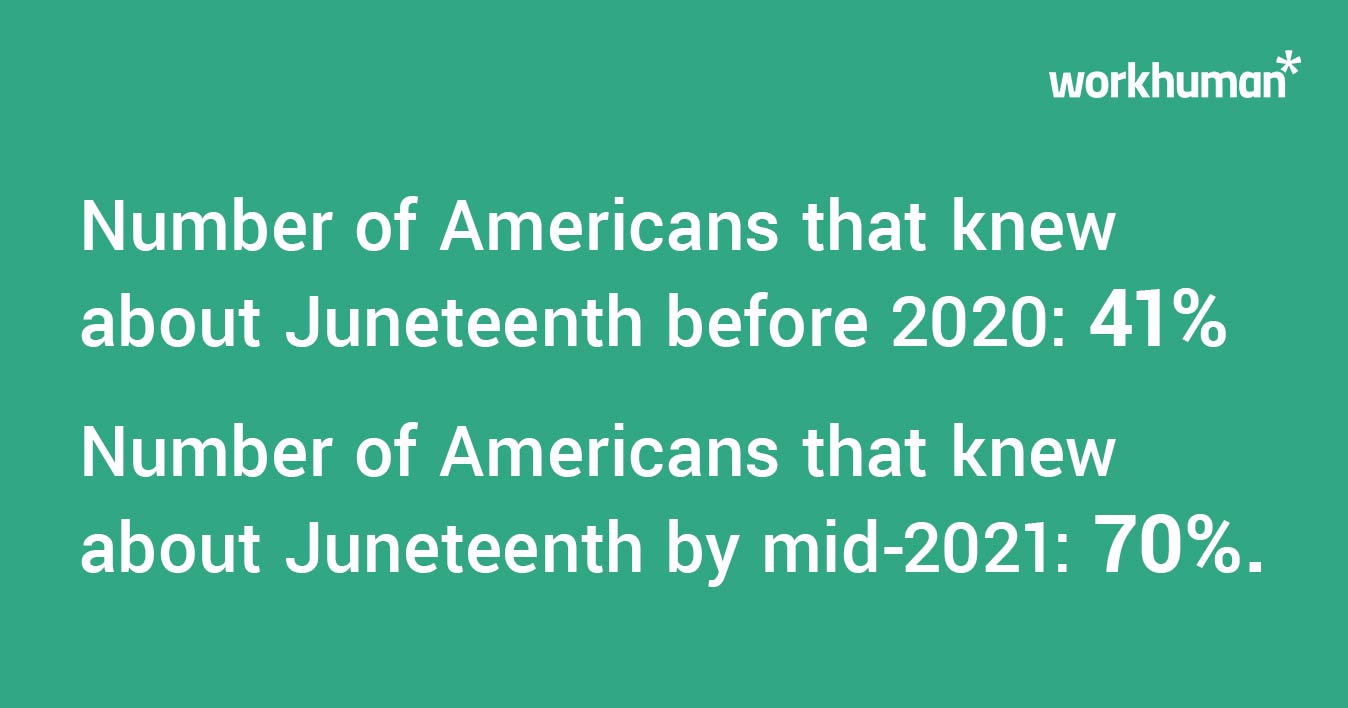
Juneteenth is a day with a rich history. It is essential for every organization to observe it with respect and a deep understanding of the day.
2. Workplace themes of Juneteenth
Your office serves as a crucial space for commemorating Juneteenth and fostering greater inclusion, teamwork, trust, and acceptance among colleagues. Here are some thoughtful Juneteenth ideas for the workplace.
- Artistic celebration: Dive into the vibrant art that commemorates Juneteenth, showcasing pieces reflecting its significance and history.
- Music and literature: Create a theme centered around the rich music and literature that highlights Juneteenth, promoting inclusivity through artistic cultural expression.
- Support social justice: Organize donation drives to support social justice causes, demonstrating commitment to the values Juneteenth stands for.
- Educational engagement: Host movie screenings or discussions about Juneteenth's history, providing educational insights into its importance.
- Vibrant decorations: Decorate the office with Juneteenth's traditional colors—red, green, and black—to honor and celebrate this day.
- Flags and quotes: Display and use the Juneteenth flag colors and inspirational quotes around the workplace to inspire and educate team members about this day’s deep significance.
By integrating these themes, you can make Juneteenth a medium to create a more inclusive and aware workplace environment. This is why organizations must understand what DEI initiatives are and how best to use them.
3. Take a Juneteenth-inspired field trip
Your local community is a rich resource for delving into Black history and culture. Check if nearby museums or educational groups have any Juneteenth events plannedOpens in a new tab. Experiencing historical sites and viewing photographs firsthand can offer essential context and expand your understanding.
If local events are lacking, or if you manage a team with remote workers, consider organizing a virtual event. This can offer a similarly enriching experience, making it accessible for everyone, regardless of their location.
4. Create a Juneteenth book club
Exploring works by Black authors is an excellent way to deepen your understanding of Black culture and experiences. Book clubs provide a relaxed yet structured setting for discussions and exchanging ideas.
Here are some recommendations for books to enrich your Juneteenth celebration:
Books
- Between the World and Me Opens in a new tabby Ta-Nehisi Coates
- Beloved Opens in a new tab by Toni Morrison
- I Know Why the Caged Bird SingsOpens in a new tab by Maya Angelou
- A Little Devil in AmericaOpens in a new tab by Hanif Abdurraqib
- Four Hundred Souls by Ibram X. Kendi and Keisha N. Blain
- Stony the Road Opens in a new tab by Henry Louis Gates, Jr.
5. Trivia game
Games are a delightful way to engage and educate, and creating a Juneteenth-themed trivia challenge, quiz, or crossword is a fantastic method to raise awareness about the day. Consider offering prizes to those who excel in a trivia game focused on African-American history.
You can use platforms like Kahoot to organize the Juneteenth trivia game, making it a fun activity for your team.
6. Support Black-owned businesses
Support Black-owned businesses on Juneteenth and throughout the year by choosing where you spend your money. For example, consider sourcing food and catering from Black-owned restaurants for department meetings and on-site gatherings.
For a Juneteenth book club, try purchasing books from a Black-owned bookstore. Investing in Black-owned businesses helps build a more equitable world.
Even if your organization doesn’t make direct purchases, providing employees with a list of local Black-owned businesses and restaurants encourages them to invest their time and money in the community.
7. Juneteenth movie night
Workplace groups can also choose to watch movies, TV shows, documentaries, or listen to podcasts. What is important is not the medium but the focus on Black subjects, the depth of the discussions, and supporting Black creators.
Movies, Docs, and TV Shows
- Selma
- Just Mercy
- Monster (Netflix)
- 13th
- It’s a Wonderful Plight
- Summer of Soul (…Or, When the Revolution Could Not Be Televised)
Podcasts
- Code SwitchOpens in a new tab
- 1619Opens in a new tab
- Louder than a RiotOpens in a new tab
- The StoopOpens in a new tab
- Therapy For Black GirlsOpens in a new tab
8. Bring in a guest speaker
Inviting guest speakers to talk about Juneteenth and related themes can be a meaningful way to observe this important day. Guest speakers can share their personal experiences and insights, inspiring employees to broaden their understanding and viewpoints.
This approach, just like a book club, is also suitable for virtual settings, making it accessible to remote employees.
9. Provide a paid day off to the Juneteenth community
The decision to recognize Juneteenth as a federal holiday underscores its importance in American history. Like most federal holidays that come with a paid day off, Juneteenth should be similarly honored.
To ensure employees understand the significance of the day off, combine this with activities that offer educational and enlightening experiences.
Additionally, you might encourage employees to use their day off as a day of service, support Black-owned businesses and organizations, and further educate themselves about the historical and ongoing struggles of the African American community.
10. Volunteer to support relevant causes
Volunteering with organizations that make a positive impact on the Black community is a wonderful way to celebrate Juneteenth.
With many street fairs, festivals, and other public Juneteenth events taking place in your area, consider exploring opportunities for your employees or organization to contribute.
This engagement not only honors the day but also fosters a spirit of camaraderie and support.
11. Donate to Black-led non-profits and charities
Supporting non-profits and organizations that work towards positive change in Black communities can be achieved by "voting with your dollar."
As an organization, you can make direct contributions or match donations made by employees to civil rights and social justice groups of their choice. This approach amplifies the impact of your support and encourages a culture of giving.
Some organizations to consider donating to are:
- NAACPOpens in a new tab and NAACP Legal Defense FundOpens in a new tab
- The National Black Child Development InstituteOpens in a new tab
- The Okra ProjectOpens in a new tab
- The Bail ProjectOpens in a new tab
12. Establish or bolster your DEI Employee Resource Group
An Employee Resource Group (ESG) keeps the spirit of Juneteenth alive year-round. Consider supporting and promoting the work of diversity, equity, and inclusion within your organization. These voluntary groups strive to uplift traditionally marginalized communities.
Acknowledging their efforts and putting their recommendations into practice demonstrates a genuine commitment to creating a more diverse, equitable, and inclusive workplace.
Juneteenth should not be a time to burden these groups with extra work. Instead, use it as an opportunity to consult with them on how to implement Juneteenth celebrations, effectively facilitate discussions, or gather reputable resources on African American history.
A workplace culture that values inclusion understands the purpose of these activities. But how do we measure inclusion?
How do we celebrate Juneteenth in a virtual environment?
With a virtual work environment, you can celebrate Juneteenth with remote employees, too. It can be in the form of virtual events such as games, museum visits, or donation drives to emphasize the importance of cultural diversity in the workplace.
Virtual Juneteenth history and cultural tour
Lonely Planet has ranked Juneteenth: Emancipation Virtual Tour as one of the best ways to honor the day virtually. It comprises narrating stories of leaders and allies and knowing why barbecue is a celebrated Juneteenth food.
There is a live streaming of visits to Hampton, Virginia, where your team experiences Black history at Fort Monroe, where the first enslaved people landed in 1619.
Such virtual Juneteenth tours narrate the cultural significance and history for your team.
Host a Juneteenth interactive webinar
Interactive webinars on Juneteenth create a space for dialogue to honor and celebrate it.
One such webinar by the National Inclusive Excellence Leadership Academy (NIXLA) organized a change management and diversity, equity, and inclusion leadership webinar to explore the contemporary meaning of Juneteenth.
It also discussed the steps leaders can take to promote a culture of inclusion, allyship, anti-racism, and Black joy.
Remote volunteering opportunities
Employees working remotely within a city can organize an in-person volunteering activity with a non-profit organization in the area. Give a paid day off to global teams to volunteer in their communities on Juneteenth.
Several volunteering opportunities help people spread across the globe collaborate on a project to promote the significance of Juneteenth.
Volunteering helps form a bond among the team members. Consider working with a BIPOC-led organization to empower Black, indigenous, and people of color in your community and organization.
Organizations such as match.org can help you find remote Juneteenth volunteering opportunities in your area.
What are the benefits of celebrating Juneteenth?
The primary reason for celebrating Juneteenth remains education, inclusion, and cultural sensitization. And its importance cannot be overstated.
In our report, 'UNLEASHING THE HUMAN ELEMENT AT WORK: Transforming Workplaces Through Recognition', we found that 28% of white employees strongly agree that they receive equitable recognition, but only 19% of black employees say the same.
Want to know what goes into nurturing a culture of recognition? Read the full Workhuman-Gallup report here:
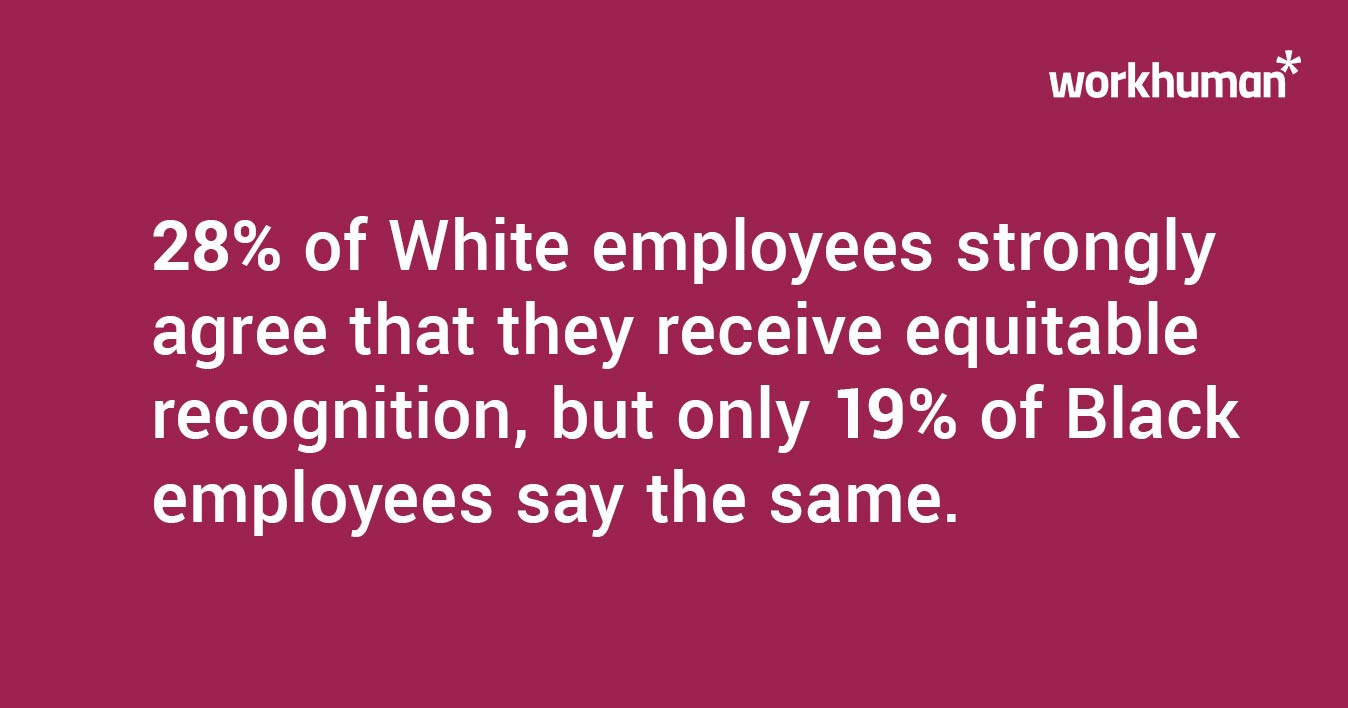
Celebrating a historical holiday like Juneteenth can be a profoundly inspiring and uplifting experience for everyone in an organization. Here are some tangible benefits of dedicating time to recognize, honor, and promote the significance of Juneteenth.
Promoting diversity and inclusion
The more your employees feel they belong to the organization, the more likely they are to be committed to the business goals. Some of the benefits of DEI initiatives are:
- Emotional investment: According to a non-profit organization that helps build better workplaces for women, 35% of an employee's emotional investment and 20% of their desire to stay are linked to inclusion at work.
- Innovation: Internal Labor Organization (ILO) finds that businesses with an inclusive culture see a 59.1% higher creativity and innovation and a 37.9% better assessment of consumer needs.
- Lower absenteeism: An article by Harvard Business Review states that organizations with a 10% higher perception of inclusion see lower absenteeism in the course of a year.
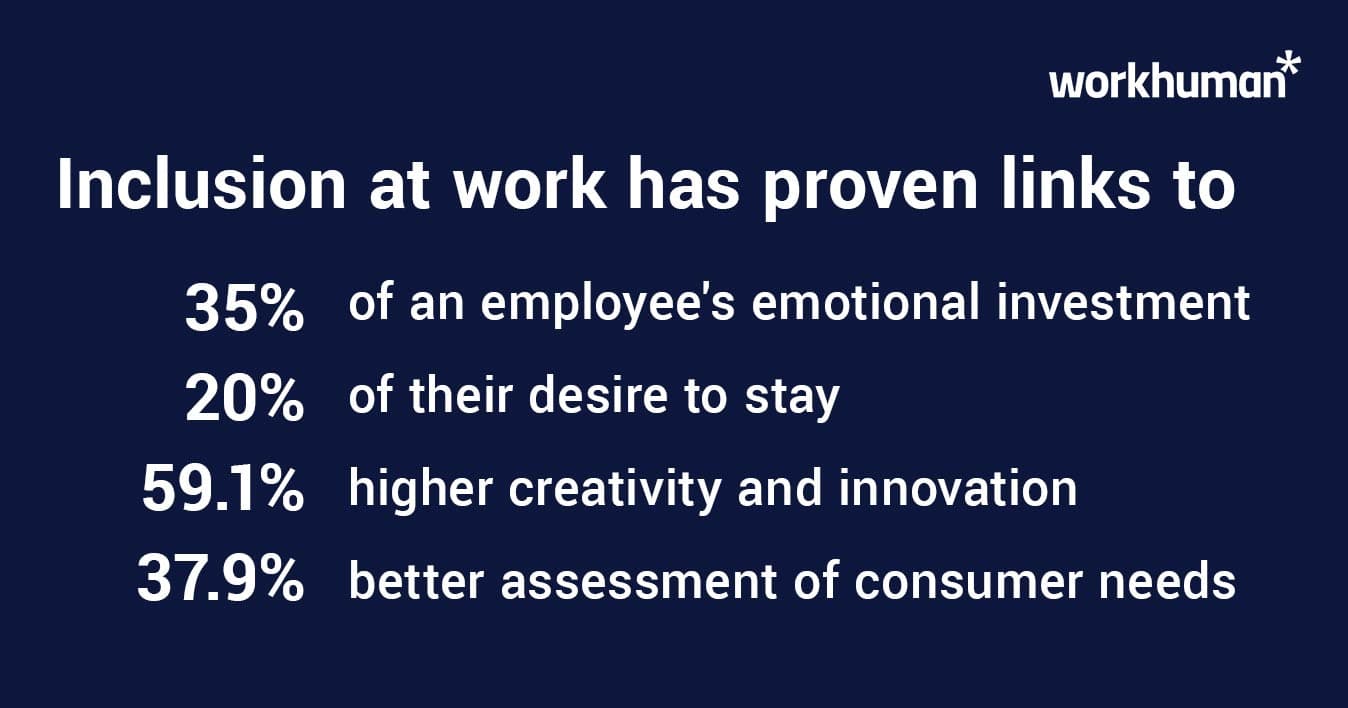
Enhancing employee engagement
Celebrating Juneteenth at work directly impacts employee engagement. Humans are wired to seek connection, and the need for it has become even more prominent with the rise of hybrid work.
Events such as Juneteenth make them feel connected to their peers and the organization's mission. One of the benefits of an employee resource group is that they can take the direct initiative to promote Juneteenth at work.
Encouraging team building
With activities such as volunteering for BIPOC causes, screening movies and plays, and listening to music and podcasts, teams bond with each other while incorporating inclusivity in their life.
Their productivity and loyalty at work are directly linked to the bond they have with peers, management, and the company and its values.
Attracting and retaining talent
According to a report, finding and hiring the right talent will be a key challenge for businesses for the foreseeable future. Approximately 33% of U.S. employers say that the skills gap has increased, and 80% find it difficult to fill the job openings due to this.
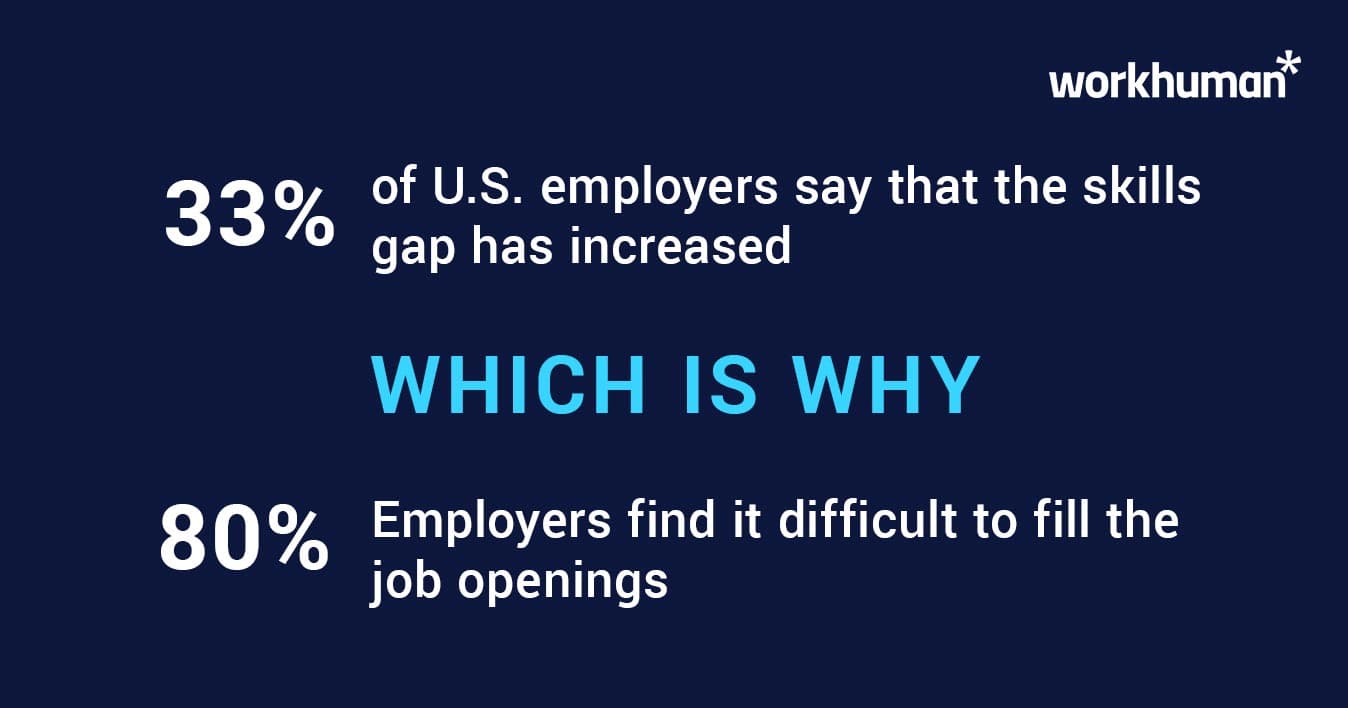
Job seekers are increasingly considering an employer's values and commitment to building cultural competence and supporting social and environmental causes when making a joining decision. Finding and retaining talent are among the many benefits of cultural competence in the workplace.
Transforming the workplace environment
Juneteenth activities can and should be a perennial component of your organization’s DEI strategy. When the experiences of the Black community are respected and shared, everyone benefits. An organization with a 10% higher perception of inclusion sees lower absenteeism per year.
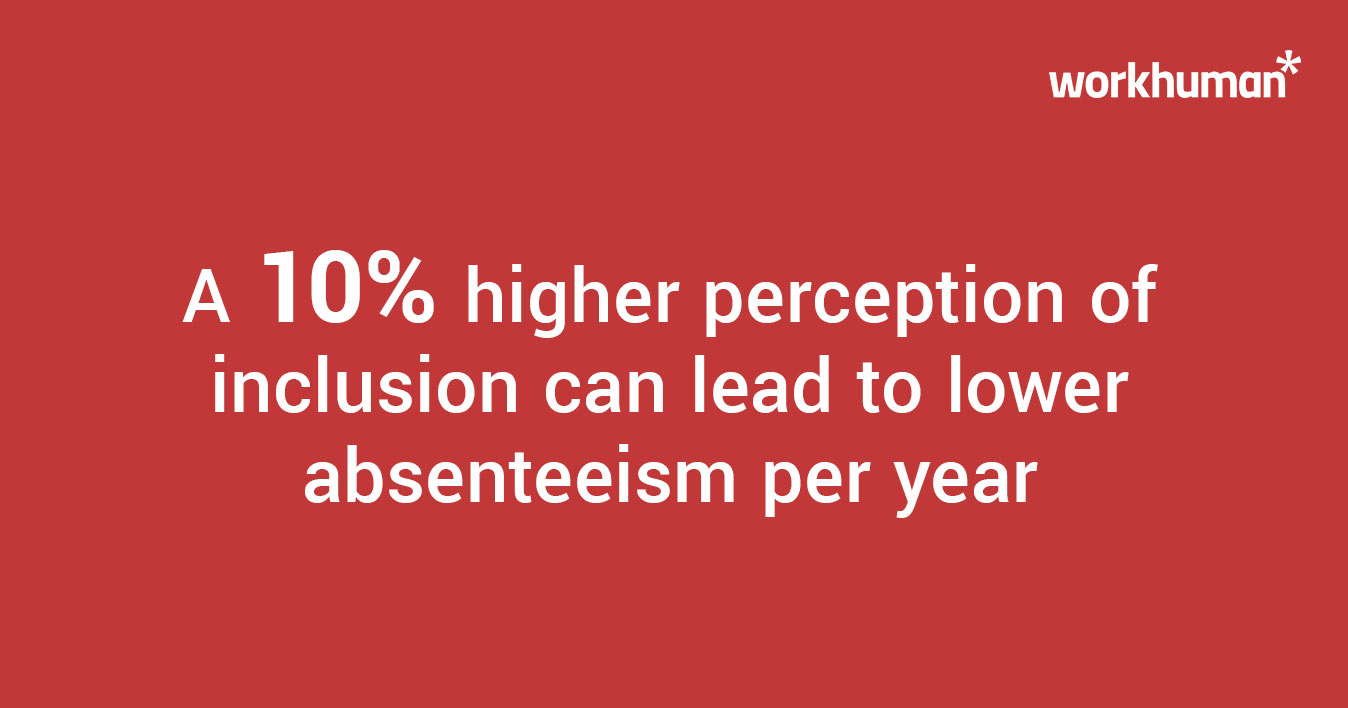
Time and again, we find that a diverse and inclusive workplace is more successful than one that is not.
Makes an impact on the community
Organizations are a part of the community they operate in and leaders should always look for ways to give back.
Whether ordering lunch from Black-owned restaurants or coordinating volunteer groups to help at a non-profit, organizations can celebrate Juneteenth in a way that uplifts those around them.
Conclusion
Juneteenth is an important day in American history. By delving into the reasons we celebrate this day and embracing it as a chance to broaden our understanding of its history and enduring impact, you can motivate your employees and foster a more inclusive company culture.
As you plan your workplace's Juneteenth celebrations, remember that the essence of this day lies in reflection, education, and community. Whether through hosting educational sessions, sharing diverse voices, or supporting Black-owned businesses, each activity is a step toward a more inclusive and aware culture.
About the author
Ryan Stoltz
Ryan is a search marketing manager and content strategist at Workhuman where he writes on the next evolution of the workplace. Outside of the workplace, he's a diehard 49ers fan, comedy junkie, and has trouble avoiding sweets on a nightly basis.